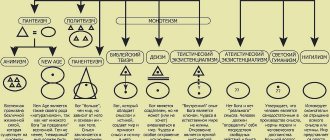“It was a very productive day”, “I want to hear constructive criticism” - these expressions are familiar to everyone and understandable to everyone. Is the meaning of their opposite – destructiveness – known? This is how they talk about something destructive, dangerous, leading to regression, degradation, disintegration of society and personality. Let's get acquainted with the concept of “destructiveness”, define what “destructive” is in all popular phenomena.
What is destruction?
This concept is used in many scientific disciplines and means destruction, violation of integrity or structure, destruction. In psychology, destruction is the rejection of generally accepted norms and moral values, which is destructive for the individual. Moreover, this behavior affects all areas of a person’s life – his health, relationships with loved ones, communications with society.
A destructive person demonstrates in every possible way his disdain for established norms, traditions and ways of life in society. Tries to express protest through actions or words. Psychologists say that most of humanity is capable of such a model of behavior, but it manifests itself in especially difficult and critical life moments. That is why this term is more often used when studying the psychology of adolescents.
How is destructiveness dangerous for society?
Destruction is, in psychology, an individual’s desire to commit destructive actions, provoke conflicts, and oppose himself to all accepted norms of social life. A destructive personality creates a number of problems, both for himself and for his environment.
With less pronounced forms of destructive behavior, such people oppress the environment morally, being toxic friends, relatives, colleagues, parents.
They try to avoid them, since communicating with them does not bring any pleasure, and the opponent always feels humiliated and depressed after a conversation with a destructive person.
With more pronounced destructive behavior, in addition to verbal pressure, such individuals can pose a real threat not only to the psychological state of their environment, but also to their physical health.
In a fit of rage and aggression, these people can injure, maim and beat others, especially if they suffer from addictions and have poor control over their behavior.
A destructive person feels especially at ease in a home environment, where he can often mock with impunity those close to him who are weaker than him.
The problem of domestic violence and tyranny is precisely connected with this behavioral disorder, when wives and children are abused by their husbands and fathers, and the law enforcement system reacts poorly to complaints and often the situation becomes tragic.
The destructive behavior of adolescents is also of particular concern, since it can often not manifest itself clearly and parents may not even suspect that their child is prone to destructive behavior. External destruction at this age is usually expressed in vandalism and fights.
In some cases, teenagers may become involved in extreme sports and have too many tattoos on their bodies. All this is a manifestation of internal negativism. Sometimes children at this age do not express their protest openly, but completely withdraw into themselves, while having suicidal thoughts.
In such a situation, it is very difficult to recognize internal destruction, since outwardly the child’s life may look ordinary - school, friends.
In this case, it is important to know what the teenager is interested in, what he watches and what social groups he is in, since often information received from these sources can push the child to take an irreparable step.
Causes of destructive behavior
Psychologists and psychiatrists argue that a destructive pattern of behavior can be characteristic of any person on earth, only the forms and methods of its manifestation will differ. However, there are very specific reasons for destruction:
- The atmosphere and model of behavior in the family in which the child grows up. A child up to the age of five, like a sponge, absorbs everything that happens to him: how mom and dad communicate with each other, how they treat their children. Lack of attention, love and respect may spill out in the future into abnormal behavior of the individual. Also, a child can simply copy the life model of his relatives.
- Mental disorders and addiction to drugs or alcohol.
- Major failures in life and serious illnesses in which the individual decides that he has nothing to lose.
- The impetus for the development of destruction can be massive social deviations. For example, rampant crime and speculative activity, bureaucracy, mass alcoholism.
- Weakening measures of public control from the liberalization of some values and freedoms to an imperfect system of fines and punishments.
History of the study of destructiveness
In S. Freud's of the forces that drive each personality, the death instinct occupies a significant place.
It means that a person strives for a primary inanimate state through destructive behavior.
K. Lorenz , like Freud, believes that aggression is inherent in the instinctive mechanism. It promotes adaptation (what is it?), adaptation to various conditions. As well as survival among other individuals, taking their position in the social hierarchy.
A. Bass gives the definition:
“Aggression is a reaction that brings pain to the organism at which it is specifically directed.”
This is one type of behavior to achieve a goal. Often the meaning of aggression is to force another person to do something - a type of manipulation (what is this?).
F. Allan believes that this is simply a way to gather one’s strength in order to withstand external factors. L. Bender says that people use destructiveness to get closer or further away from a person or situation.
Other points of view on destructive behavior:
- natural human reflex;
- reaction to mental or physical discomfort;
- drive and passion, which brings pleasure, despite all the negativity;
- the result is frustration (what is it?) – when it is impossible to satisfy one’s needs or solve a problem.
Symptoms of destruction
Abnormal or destructive behavior can be directed at people and animals, intangible objects, and even oneself. From here, scientists identify several behavioral patterns with their characteristic destructive symptoms:
- Aggressive and cruel treatment of surrounding living beings.
- Hostile tone and construction of phrases when communicating with people around you.
- Tendency to destroy or damage intangible objects and other people's belongings.
- Personality destruction also manifests itself in the desire to destroy the usual way of relations between people close to the individual.
- Episodic or constant inability to experience emotions, lack of expressed feelings.
- Threats to one's own life and those of other people and animals.
Signs of a destructive person (destructor)
A person's destructive nature may not be corrected in childhood or adolescence, so he will carry it throughout his life. How do you know if this type of person is in front of you?
Hidden and obvious threats
It is important for destructive individuals to know that they are better than others, and the whole world owes them. To maintain this role and pride, he does not allow others to express their opinions. It also suppresses any disobedience and criticism. The interlocutor may hear a commanding tone or a threat.
Triangulation
A person involves third-party people in a dispute, whose opinions supposedly coincide with his, and not his opponent’s. He makes references to the fact that his colleagues, friends, scientists are also on his side. Thus, it puts pressure on the victim to break and accept the interlocutor’s position.
Bounds checking
Such people like to check where other people's boundaries are. And every time they try to break them, while they remain unpunished. Therefore, if the victim returned to the offender, then this gives the latter a reason to further exhaust her with his exploration of the framework.
Cruel sarcasm
Humiliating others is a favorite activity of narcissists (who is that?) with destructive personalities. Sarcasm (what is it?) helps a lot with this, since you can turn everything into an innocent joke in time. And if a person is offended, then it is his “problem” that he is so sensitive.
Gaslighting
If you hear, in response to your remark about the behavior of the character being discussed, the phrase: “That didn’t happen!”, “What happened to your memory?!”, “It seemed to you,” then know that this is manipulation. The interlocutor is trying to destroy confidence in reality and shake the conviction that he is right.
Types of destruction
A large number of scientists have classifications of destructive activities. However, the complexity of such studies is complicated by the fact that the concept of norm changes over time. The most common types of abnormal behavior:
- Delinquent , in which an individual commits illegal acts punishable by criminal or administrative law.
- Deviant , during which a person actively rejects the cultural values and moral norms accepted in society.
Forms of destructive behavior
Depending on the characteristics of a person’s relationship with society and the degree of adaptation in it, destructive behavior can take the following forms:
- Radical adaptation . In such a situation, a person tries to completely change and adapt the surrounding reality to himself.
- Hyper-adaptation , in which a person sets unattainable goals and objectives.
- Conformist adaptation . With this form of behavior, the person visually adapts to those dogmas and norms that he does not accept.
- Deviant adaptation , that is, the commission of actions and deeds that contradict accepted norms.
- Socio-psychological disadaptation , during which a person is sure that he is not obliged to adapt to society and comply with its norms and laws.
Destructive conflict - what is it?
A destructive conflict is an extreme degree of tension in a relationship in which one or both parties do not seek to find any common ground and resolve the differences that have arisen.
Destructive conflicts are destructive and do not lead to effective interaction, finding a compromise or making decisions more or less satisfactory to both parties.
The opposite concept is a constructive conflict, in which opponents reasonably believe that a compromise will be more beneficial than prolonged disputes, bickering, and even more so physical influence, and strive to come to a common denominator as soon as possible.
There is also another form of behavior in conflict situations - conformism.
With this behavior, a person unconditionally submits to the will of the opponent, even if he does not agree with him. In the event of contradictions and disagreements, people who are not characterized by destructive behavior strive in every possible way to reach a consensus as quickly as possible.
Even if the conflict takes on a not entirely pleasant outline, they, as a rule, save face and do not stoop to rudeness, obscene language and the use of physical force.
A destructive personality is usually generally incapable of perceiving the opinions of others and, when in conflict, deliberately aggravates the situation, becomes personal, insults opponents, and behaves provocatively and provocatively.
Destructive conflicts lead nowhere. In such disputes, no solution emerges, and the parties disperse only to meet again to recall past grievances and continue to further aggravate the situation.
Psychologists encourage learning to manage conflicts, and we can say with confidence that this skill will be useful to absolutely every person.
Destructiveness - how to get rid of it?
After some people learn what this concept of destruction is, they begin to understand some of the symptoms of its manifestation in themselves or in their loved ones. To eradicate them, psychologists recommend:
- Work through fears of inferiority and love yourself. This can be done either independently or with a specialist.
- Develop altruism and the ability to empathize.
- Learn to develop your own importance by improving yourself, rather than humiliating others.
- Learn techniques for environmentally friendly disposal of accumulated aggression.
- Express yourself in creativity, in which you can splash out your emotions in a civilized manner.
Destructiveness in childhood
Psychologist Alfred Adler was the first to study destructive behavior in children and classify possible motives .
Power struggle
Every child strives to show his strength and try to pull the veil of power over himself.
Some do this passively , and after mom’s words: “Do your homework” or “Wash the dishes,” they simply do not follow these instructions. Others immediately aggressively show their position: “I don’t want to, I won’t.”
In such a situation, parents should explain what the consequences of non-compliance and disobedience will be. Let your son or daughter take responsibility (what is that?) for their actions and decide what to do.
To attract attention
If a child constantly pulls at his parents at home, on the street, and in the store, and also annoys teachers by frequently leaving the classroom during class or talking loudly, then these are all ways to attract attention. It's obvious that he's missing.
Parents should devote more time to their children. Not only when you need to criticize them, but also in a positive way. And if the child whines: “Pay attention! Play now!”, then you should say: “Okay, in 10-15 minutes, when I’m free.”, and not run away immediately, so that this does not become a mechanism for manipulation.
Revenge
If children don’t like the way they are treated , they will take revenge in a variety of ways: calling people names, lying, stealing, painting the walls or their mother’s favorite book, or even hitting.
In such situations, it is better to consult a psychotherapist. Most likely, the parents cannot establish a trusting relationship, and they themselves show initial anger. Therefore, we need a specialist and an outside perspective.
Demonstration of insolvency
The child does not believe in the success of completing tasks and instructions. Therefore, he skips school and tutors, does not want to go to the blackboard and starts a scandal on this basis, lies.
Most likely, the reason is constant criticism and an authoritarian method of education, which needs to be changed immediately. Such children need to be supported in all their endeavors, praised and given attention when spending time together.











